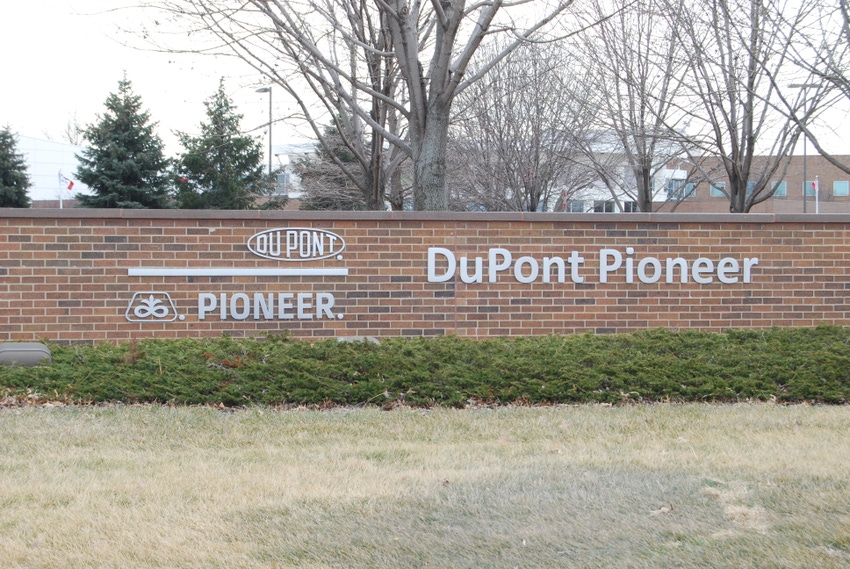April 3, 2017

Leaders of the Iowa Farmers Union gathered in Des Moines on March 30 to let the public and policymakers know why they believe the looming mega-mergers of several large ag corporations will hurt farmers. IFU held a press conference near the Iowa State Capitol, to announce its lobbying effort on this issue.
IFU President Aaron Lehman was joined by IFU members in meetings with both Iowa Assistant Attorney General Eric Tabor and a representative from the office of U.S. Sen. Chuck Grassley. The National Farmers Union and IFU have both publicly opposed the Monsanto-Bayer, Dow-DuPont and Syngenta-Chem China mergers, and are urging public officials to do the same.
The Dow-DuPont merger alone would create the single largest biotechnology and seed firm in the United States. It would give the resulting company control of about 41% of the market for corn seed and 38% of the market for soybean seed. It would also mean job losses for Iowa, with DuPont facilities and offices moving from Ames, Iowa, to Midland, Mich. According to Lehman, “These mergers will lead to fewer choices in the marketplace for farmers and higher prices for inputs at a time when farmers are already tightening their belts. We need Congress and the U.S. Department of Justice to take action now.”
Asking each official to use influence
Both Congress and state attorneys general have an opportunity to influence the pending mergers. While Grassley has expressed concern over the Dow-DuPont merger early on, especially the loss of Iowa jobs it will create, he has not publicly opposed the merger. Iowa Attorney General Tom Miller has yet to make a public statement, but he could intervene in the merger approval process on behalf of Iowa.
IFU is asking each official to use their influence to stop these big mergers. Farmers and ranchers have been dealing with consolidation in the industries that both supply and buy from farming operations over the past several decades. Today, just six companies control the markets for inputs farmers need to grow their crops, and four companies control the majority of purchasing and processing of cattle, hogs and chicken. “This consolidation has led to increased costs for farmers, less choice and less competition in the marketplace, less innovation, and increased prices for consumers. In turn, it results in farmland consolidation and a depopulation of rural areas,” says Lehman.
The mergers will likely be approved or denied this summer, but the DOJ hasn’t announced a schedule for hearings. Lehman says IFU and allies will continue pushing for strict oversight for any mergers of this magnitude.
EU OKs Dow-DuPont merger plan
In late March, the European Union approved the proposed $130 billion merger. The approval is conditional upon Dow and DuPont divesting certain assets, but it is a big victory for the companies. It’s the first green light a regulatory body has given the deal that would combine Dow and DuPont into a massive corporation, with holdings in agriculture, nutrition and health, material sciences, and safety products.
Within two years of when the merger is completed, the combined entity, to be known as DowDuPont, will split into three independent companies. Two of those businesses will be based in Wilmington, Del. The third will be based in Dow’s hometown of Midland, Mich. DuPont is the parent firm of Iowa-based DuPont/Pioneer. IFU leaders are worried there will be more job cuts in Iowa, including at the longtime Pioneer headquarters and research facilities at Johnston.
Dow and DuPont officials say longer term, the intended three-way split is expected to unlock even greater value for shareholders and customers, and more opportunity for employees, as each company will be a leader in segments where global challenges are driving demand for their product offerings. Now that Dow and DuPont have cleared the first big hurdle — EU approval — other countries are expected to vote in favor soon. The merger is being scrutinized by the U.S., Canada and Brazil. It isn’t known when those countries will announce a decision.
The statement released by Dow and DuPont said: “The companies continue to work constructively with regulators in the remaining relevant jurisdictions to obtain clearance for the merger, which we are confident will be achieved.”
Trump urged to oppose Dow-DuPont merger
The European Commission had been skeptical of the deal, worried it would stifle competition in the ag sector. Dow and DuPont responded by agreeing to divest some business units to appease regulators. Margarethe Vestage, chairwoman of the European Commission, the EU’s top regulatory agency, said in a statement that the divestiture conditions were necessary to ensure the merger “does not reduce price competition for existing pesticides or innovation for safer and better products in the future.”
Following EU approval in late March of the proposed merger between Dow and DuPont, the National Farmers Union called on the Trump administration to block the deal. “The reduction in competition that would be wrought by a Dow-DuPont merger will result in less innovation, higher prices and less choice for farmers,” said NFU President Roger Johnson in a letter to President Donald Trump. “Given the damaging and lasting effects this merger will have on family farmers and rural America, we urge you to oppose this merger.”
You May Also Like




